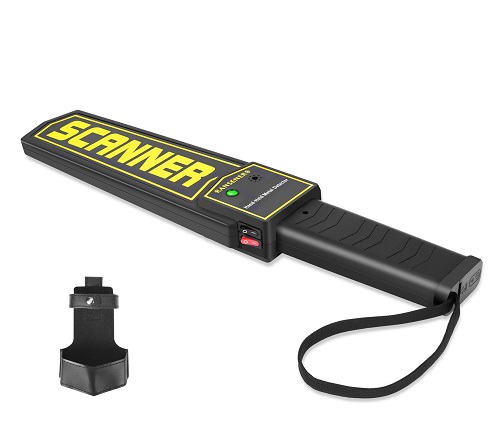A Metal Detector is an essential tool designed for locating and identifying metal objects buried underground, submerged in water, or hidden within various materials. Widely used in security applications, treasure hunting, construction, and archaeological exploration, metal detectors are equipped with advanced technology to detect metallic items quickly and accurately.
Key Features:
- Advanced Detection Technology: Equipped with sophisticated electromagnetic technology that enhances sensitivity and discrimination between different types of metals, allowing users to identify targets effectively.
- Adjustable Sensitivity Settings: Many models feature adjustable sensitivity levels, enabling users to fine-tune the detector for specific environments or metal types, minimizing false alarms and enhancing accuracy.
- Audio and Visual Indicators: Most metal detectors provide both audio signals and visual displays, allowing users to quickly identify and assess detected metals. Some models also feature adjustable volume controls.
- Lightweight and Ergonomic Design: Designed for comfortable use over extended periods, these detectors often feature adjustable shafts, cushioned handles, and lightweight materials, making them easy to carry and operate.
- Waterproof Options: Many metal detectors come with waterproof coils, allowing for use in wet conditions, such as on beaches or during underwater searches.
Applications:
- Security Screening: Widely used in airports, government buildings, and public events to detect concealed weapons or unauthorized metal items on individuals or within bags.
- Treasure Hunting: Ideal for hobbyists and enthusiasts searching for coins, jewelry, artifacts, and other metal objects in parks, beaches, and historical sites.
- Construction and Excavation: Utilized by construction workers to locate underground metal objects such as rebar, pipes, and cables, ensuring safe digging practices.
- Archaeological Exploration: Employed by archaeologists to locate and identify buried metal artifacts, enhancing historical research and excavation efforts.
Why Choose a Metal Detector?
Investing in a Metal Detector enhances safety and efficiency across various applications. Its advanced technology, adjustable settings, and ergonomic design make it an indispensable tool for professionals and hobbyists alike.
Technical Specifications:
- Detection Depth: Varies by model, typically ranging from 5 cm to over 3 meters, depending on the size and type of metal being detected.
- Operating Frequency: Commonly ranges from 5 kHz to 20 kHz, with higher frequencies suitable for small targets and lower frequencies for larger items.
- Power Source: Usually powered by rechargeable batteries or standard alkaline batteries, with battery life ranging from 20 to 40 hours of continuous use.
- Weight: Lightweight designs typically weigh between 1 kg to 3 kg for easy handling.
- Coil Size: Available in various sizes, commonly from 8 inches to 15 inches in diameter, affecting the depth and sensitivity of detection.


